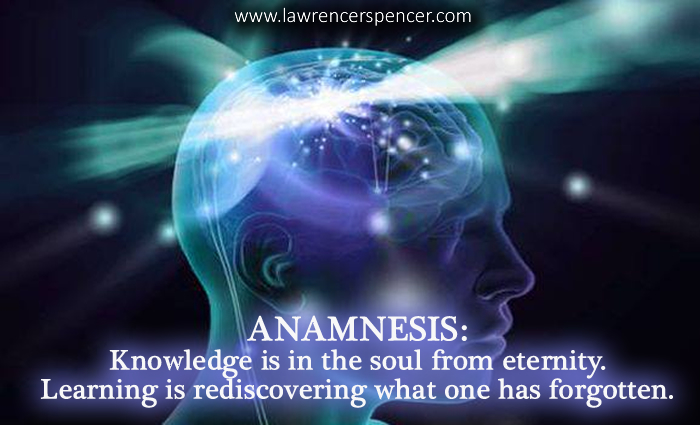Republished by Blog Post Promoter
Anamnesis (/ˌænæmˈniːsɪs/) is a concept in Plato‘s epistemological and psychological theory that he develops in his dialogues Meno and Phaedo, and alludes to in his Phaedrus.
It is the idea that humans possess knowledge from past incarnations and that learning consists of rediscovering that knowledge within us.
Socrates suggests that the soul is immortal, and repeatedly incarnated; knowledge is actually in the soul from eternity, but each time the soul is incarnated its knowledge is forgotten in the shock of birth. What one perceives to be learning, then, is actually the recovery of what one has forgotten. (Once it has been brought back it is true belief, to be turned into genuine knowledge by understanding.) And thus Socrates (and Plato) sees himself, not as a teacher, but as a midwife, aiding with the birth of knowledge that was already there in the student.
Plato develops his Theory of Anamnesis, in part by combining it with his theory of Forms. First, he elaborates how anamnesis can be achieved: whereas in Meno nothing more than Socrates’ method of questioning is offered, in Phaedo Plato presents a way of living that would enable one to overcome the misleading nature of the body through katharsis (Greek: κάθαρσις; “cleansing” (from guilt or defilement), “purification”). The body and its senses are the source of error; knowledge can only be regained through the use of our reason, contemplating things with the soul (noesis). Secondly, he makes clear that genuine knowledge, as opposed to mere true belief (doxa), is distinguished by its content. One can only know eternal truths, for they are the only truths that can have been in the soul from eternity.
For the later interpreters of Plato, anamnesis was less an epistemic assertion than an ontological one. Plotinus himself did not posit recollection in the strict sense of the term, because all knowledge of universally important ideas (logos) came from a source outside of time (Dyad or the divine nous), and was accessible, by means of contemplation, to the soul as part of noesis. They were more objects of experience, of inner knowledge or insight, than of recollection.
_______________________
Socrates — (c. 469 BC – 399 BC) was a classical Greek Athenian philosopher. Credited as one of the founders of Western philosophy, he is an enigmatic figure known chiefly through the accounts of later classical writers, especially the writings of his students Plato and Xenophon and the plays of his contemporary Aristophanes.
Plato — (428/427 BC– 348/347 BC) was a philosopher in Classical Greece. He was also a mathematician, student of Socrates, writer of philosophical dialogues, and founder of the Academy in Athens, the first institution of higher learning in the Western world. Along with his mentor, Socrates, and his student, Aristotle, Plato helped to lay the foundations of Western philosophy and science.
— Reference Source: Wikipedia.org

